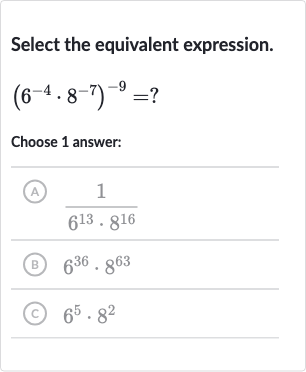Full solution
Q. Select the equivalent expression.?Choose answer:(A) (B) (C)
- Calculate new exponents: Now, we calculate the new exponents by multiplying the inner and outer exponents for both bases.For , we have .For , we have .So, and .
- Combine the results: Next, we combine the results to get the equivalent expression..
- Match the answer choices: We now look at the answer choices to see which one matches our result.(A) does not match our result.(B) matches our result.(C) does not match our result.
- Correct answer: Therefore, the correct answer is .
More problems from Evaluate expressions using properties of exponents
QuestionGet tutor help

